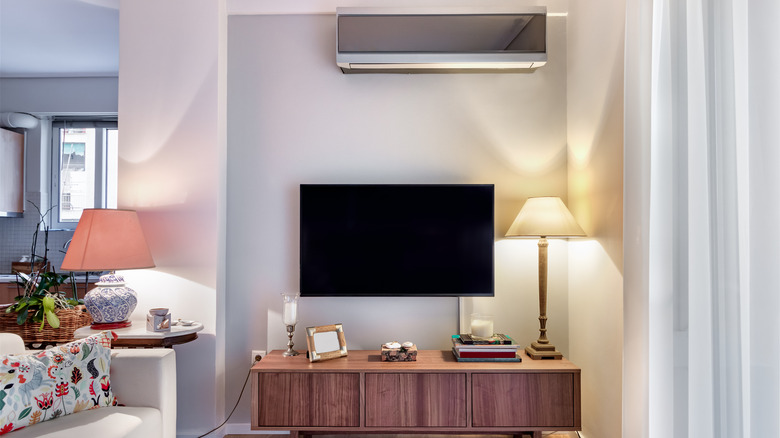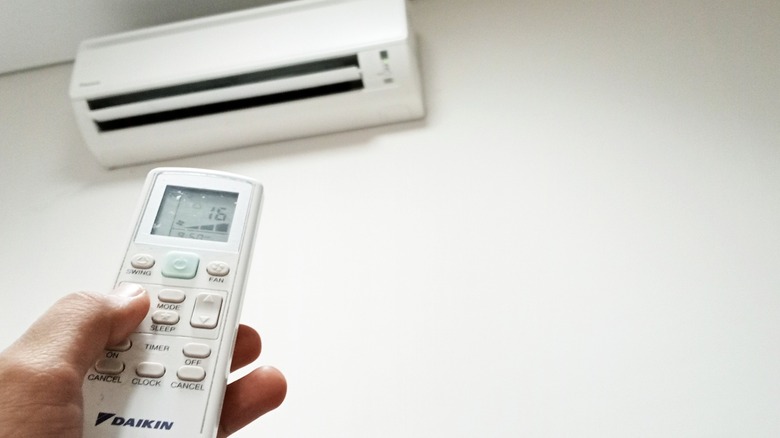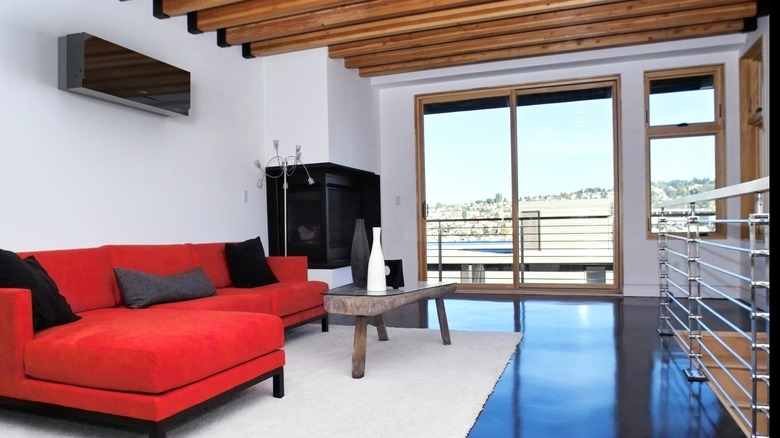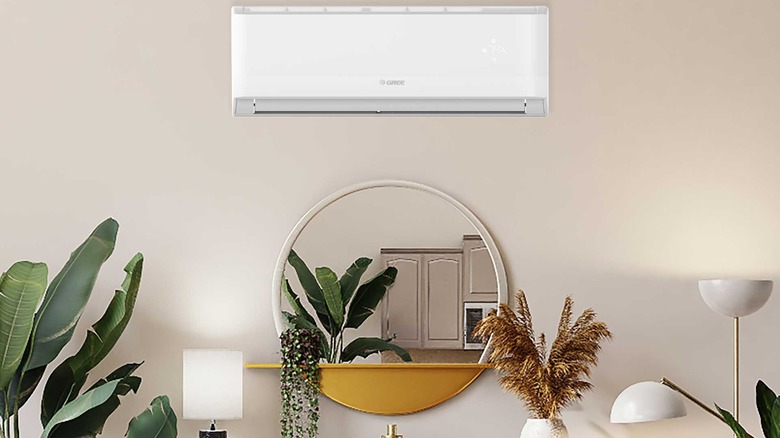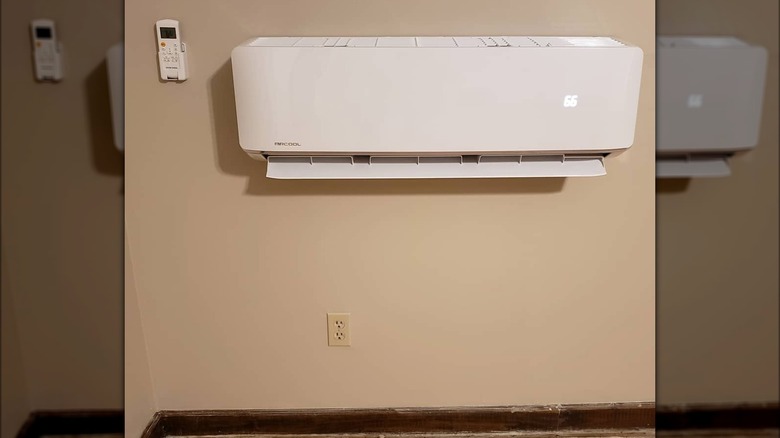Top-Rated Mini-Split Brands To Consider For Your Home (& Which To Skip)
We may receive a commission on purchases made from links.
A mini-split air conditioner is a great choice if you want to add heating and cooling options to each room with separate controls sans ductwork. Luckily, numerous brands offer top-of-the-line mini splits to help you weather the cold and hot months the way you want. However, you might get lost amidst the multitude of brands offering such appliances. In case you need help on this front, we have prepared a list of the best four mini-split companies you should consider for your home, including Daikin, Mitsubishi, Gree, and Senville. We've also included two brands, MrCool and Klimaire, to avoid so you don't fall prey to their marketing gimmick.
Still, you must consider a few things before buying a mini-split from the approved list of brands, too. For starters, you want to look at each model's SEER (Seasonal Energy Efficiency Ratio) rating since this determines the amount of energy the unit would draw when in use. So, the higher the SEER rating, the more you'll save on utility bills, with the minimum set at 10 units in the US. You also want to check the unit's BTUs (British Thermal Units) to understand the area the mini-split can cool and heat efficiently. The unit's noise level – measured in decibels (dB) or A-weighted decibels (dBA) — is another thing you want to check. Price, ease of installation, maintenance, smart features, customer service, and warranty must be considered, too. Considering these factors, here are the mini-split brands you can buy and which to avoid.
Daikin: The premium mini-split brand offers endless choices
One of the top-rated mini-split brands, Daikin offers split and multi-split variants to fit homeowner's varied needs. For instance, if you want a unit in just one room, you can go with the single split variant. However, if you want to install individual ACs in your house sans the complications related to ductwork, multi-split units' lone outdoor unit can power a maximum of five indoor ones. Further, the brand has a wide range of products, ensuring there's something for everyone, whether you're looking for a model that's energy-efficient, offers variable speed, or can be installed into tight spaces. Moreover, the varied price point (between $1,000 and $7,800 per Walmart) targets both budget-conscious and high-end consumers.
Additionally, all of its products provide SEER2 level cooling (up to 22.5), so you don't have to worry about your electricity bills – regular maintenance will help, too. Plus, specifically engineered sound blankets promise reduced compressor noise, and the Daikin Inside Intelligence is a smart way to stay on top of your AC's health. Despite these benefits, the one thing that sets Daikin's mini-splits apart is its limited unit replacement and parts warranty. You may enjoy up to 12 years of warranty, provided you register your device online within two months of installation. It also offers a detailed FAQ guide and chatbot support. On the flip side, you'll have to contract a registered pro and bear the cost to install a mini-split air conditioner.
Mitsubishi: Energy-friendly and eco-conscious mini-split brand
Mitsubishi is an energy-friendly company, encouraging its customers — potential and existing — to swap their old, fossil fuel-consuming appliances with its eco-conscious appliances, like mini-splits. In fact, the brand highlights that its heat pumps (an HVAC heating and cooling device) offer anywhere between 160 and 390% more efficiency than traditional gas-powered models. Additionally, it claims that its electric products don't contribute to global warming since they don't release greenhouse gases, like CO2 (carbon dioxide). Regarding the residential mini-splits, they can either be installed against a wall or ceiling, or placed on the floor. The price for each unit varies from $600 to 7,500 (on Walmart).
However, its pro-electric approach isn't what sets it apart; its features do. For instance, the 3D i-see Sensor automatically scans the area under its purview to determine if it's occupied to tweak temperature and airflow per your requirements. Conversely, it conserves energy in an empty space. Similarly, Econo Cool automatically regulates the air given off. Nano Platinum Filter is another nifty feature that maintains the IAQ (indoor air quality). The features differ from model to model, so go through the specifications before ordering a mini-split unit. The same applies to the noise and SEER2 levels. Plus, certain products may qualify for state or federal rebates, so don't make hasty decisions. Its 12-year limited warranty comes with strings, though. You must get a Diamond Contractor to install the product and register it within three months from the date of installation.
Senville: A smart and cost-effective mini-split brand
Although Senville seems like a novice (founded in 2005) when compared to industry giants like Daikin and Mitsubishi, it's no less impressive. According to the brand, it has sold more than 100,000 mini-split ACs in the US and Canada. Case in point, its LETO series (more commonly known as high-efficiency) ACs have found more than 200,000 takers. They double as a dehumidifier, keeping the room's moisture under control. The brand also aims to be eco-friendly and is finding ways to substitute greenhouse gas emitters, like Freon, with the ecological R410A. Priced between $800 and $4,900 on Senville's website, the mini splits might be eligible for a maximum rebate and tax credit of $4,500, making the units cost-effective.
The SEER ratings and BTU differ from model to model, so do your homework to purchase a unit that meets your basic requirements. Ion filter, noise level, self-cleaning mode, refrigerant leak detection, and self-diagnosis are a few other noteworthy features that aren't available on all units, so cover your bases. The warranty period differs, too, with some models enjoying a period of seven years while others come with five. Moreover, if smart devices are your jam, you want to check out their Alexa-enabled devices to remotely control your mini split. The brand has a page dedicated to help and support, and each unit comes with an installation kit and accessories, but you'll need a professional to install the appliance.
Gree: A brand known for efficient and elegant mini-splits
Gree is another great brand offering mini splits in the US. As the world's biggest company specializing in air conditioning, the brand boasts of more than 500 million users and is operational in over 180 markets. Its single-zone product lineup features varied models with differing key points. However, one point of similarity across models is their efficient design and seamless performance. In a bid to achieve its eco-friendly goals, the brand uses responsible refrigerants, like R410A and R32. Although the products are renowned as cost-effective, the range on Home Depot is a little wild, and you can expect to pay anywhere between $3,000. But the good news is you may qualify for rebates between $2,500 and $4,500.
Like the rebate amount and refrigerant vary from unit to unit, so does the SEER2 rating. The product design changes, too. To illustrate, LIVO GEN4 has a chic look whereas the ENVO R32 looks more functional. The cooling and heating range change, too, so pay close attention to this and account for the weather conditions you experience prior to buying a unit. This is where things get tricky. The products aren't widely available since you can only purchase GREE mini splits from registered contractors. You'll also need to hire a licensed technician to install your mini split. So, bookmark the find a contractor page in case you plan to invest in one of GREE's mini split units.
Mini-split brands you should avoid bringing home
The first name on our mini-split brands you should avoid bringing home is MrCool. We even had TikTok review the MrCool DIY mini-split and share if it's really worth the price. Our finding? The company's USP, aka DIY installation, isn't as simple as it sounds. Even though an experienced DIYer fluent in electrical connections might be able to install the unit without issues, a novice will run into multiple issues, like getting the indoor and outdoor systems to "communicate" with each other. The kicker? MrCool mentions on its website that "installation must be completed by a licensed/certified HVAC technician." Same goes for electrical connections. The company's slow or lack of response was a point of contention for some customers, too. Moreover, the warranty period varies dramatically from one split to the next. For instance, the 4th Generation E Star DIY comes with a seven-year compressor warranty and five on parts, whereas Advantage only has a two-year warranty on parts and one on compressor and remote.
Klimaire is another brand you should skip while buying mini splits for your home. While users mention that the product heats and cools well and the installation is DIY-friendly, its customer service isn't so great. People had trouble registering their product for warranty or getting them to honor the warranty on parts. Someone also had an issue with their compressor within four months of installation, and another customer found parts missing with their shipped unit.
